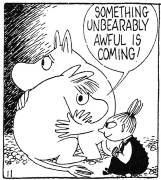|
Waldo P Barnstormer posted:What do you think of the argument for a 24bit dac being better when you have digital volume control? That's a different case, which depends on how it's implemented. For a simple and purely digital volume control where you're actually chopping off bits to control the volume (bit decimation), you obviously want a high bitrate DAC in order to preserve the dynamic range of the signal. Note that most DACs/preamps with volume controls either implement them as a 100% analog volume pot or as digitally-controlled stepped analog attenuation (basically all amps with 'endless' volume controls and -xx dB volume displays are implemented like this. Note that all of this generally doesn't matter if you're using the software volume control in your OS, as that will be handled at a high bitrate even if the output is set to 16-bit. It ups the bitrate, does the bit decimation and then reduces the bitrate again, so there's no audible loss of quality. So in other words, bit decimation's effect on sound quality only matters if you're using a 16-bit DAC that implements volume control via bit decimation. And even then, the reduction in dynamic range is pretty close to the reduction you get simple from using an analog volume control, due to the noise floor in the average listening room. The end result is that digital volume control is better in the vast majority of situations, because it's cheap and easy to implement and you avoid the channel imbalance that all analog volume pots have at low levels. And as a rule of thumb for both digital and analog systems, don't turn the gain way down on the source and then try to amplify the signal back up really loud again at the end. That will totally murder the signal. Volume attenuation should be performed as late in the chain as possible. KozmoNaut fucked around with this message at 14:34 on Nov 8, 2015 |
|
|
|

|
| # ? May 16, 2024 05:56 |
|
KozmoNaut posted:Still, as each sample's amplitude in 16-bit PCM audio must be one of 65,536 discrete values, there will be some approximation of the original analog signal. But the resulting quantization noise comes in at around -96dB, way way WAY lower than the base noise level of even the finest studios in the world, never mind the end users' listening rooms. If you look at those videos and articles from Xiph.org that were posted earlier the noise floor for 16 bit is well below that, especially with dither. DVD-Audio did the same thing as SACD far as I can tell - both Beck's Sea Change and Porcupine Tree's Deadwing are smooshed pretty flat on the CD releases, but the DVD-Audio discs were mastered with a proper amount of dynamic range. Honestly you shouldn't have to pay extra for that but it's better than nothing... KozmoNaut posted:The end result is that digital volume control is better in the vast majority of situations, because it's cheap and easy to implement and you avoid the channel imbalance that all analog volume pots have at low levels. Boy that's for sure. I love my H/K receiver but the left channel drops appreciably faster, and making fine adjustments at low (normal-ish) levels is all but impossible with the remote control. Never mind when it gets gunky and you get static and start losing channels entirely.... Panty Saluter fucked around with this message at 15:25 on Nov 8, 2015 |
|
|
|
Panty Saluter posted:If you look at those videos and articles from Xiph.org that were posted earlier the noise floor for 16 bit is well below that, especially with dither. I've watched those and linked to them dozens of times in various discussions, they're probably the best and most straightforward introduction to digital audio. The base noise floor of CD-quality audio is around -96dB, but obviously that doesn't tell the whole story. You can definitely have content below the noise floor that is still audible, and if you use noise-shaped dither, you can move the noise into higher frequencies where human hearing isn't as sensitive. The result is a slightly higher overall noise floor, but one that is also much lower at the frequencies where human hearing is most sensitive, effectively giving over 120dB of dynamic range, or about as good as the base noise floor of 20-bit audio, which in turn is about as good as you're going to get even with 24-bit audio, due to real-world physical limitations in electronics. And even with all of that said, quantization noise isn't that terribly offensive. It sounds like tape hiss because the mechanisms behind it and tape hiss are very similar. You are mapping an audio signal into discrete values. With digital audio, it's the bit-rate that limits you, and with tape it's the magnetic particles on the physical tape. It's much more important to fight intermodulation distortion than it is to fight for less quantization noise (by fighting for higher bit rates). KozmoNaut fucked around with this message at 16:05 on Nov 8, 2015 |
|
|
KozmoNaut posted:And even with all of that said, quantization noise isn't that terribly offensive. It sounds like tape hiss because the mechanisms behind it and tape hiss are very similar. You are mapping an audio signal into discrete values. With digital audio, it's the bit-rate that limits you, and with tape it's the magnetic particles on the physical tape. One of the highlights of the Xiph videos is when he explains the parallels between tape hiss and dithered quantization noise, and how that means you can measure the noise floor of tape in bits: Cassettes are around 6 bits, and high quality reel-to-reel - the current big trend among the golden eared gods desperately trying to escape the cold tyranny of digital audio's stair steps - a whopping 13 bits. 
|
|
|
|
|
Here's some nice handwaving from Audiovector, a Danish loudspeaker manufacturer. A member on another forum bought one of their subwoofers, the Ki Sub Signature. It's a $1500 sub with a 10" woofer and a 400W amplifier. It's 34x37x38cm and weighs 21kg. According to the spec sheet, the claimed frequency response is 19-180Hz That's it. No graphs, no indication whether that's at -3dB or -6dB or whatever, absolutely nothing. So the guy measured it using REW and a miniDSP UMIK-1 microphone at various distances with the sub in a corner and placed 100cm from the corner, and he got some rather different results. In his tests, the very best he got from the sub was around 33Hz at -3dB, which is a long long way from the claimed 19Hz. Since the UMIK-1 is flat to 20Hz, we can be pretty sure that the frequency response microphone isn't at fault. So he posts about it on the manufacturer's forum, asking about the results he got and how the published specs on the subwoofer were measured. He asks me to join in, since I raised a few points about anechoic measurements, which the manufacturer claims would improve the low bass performance, contrary to everything I've learned. And when I asked for some data on the measurements they performed when they wrote the spec sheet, the reply was this: quote:Low-frequency measurement is a very complex matter, and you need to be very well versed in acoustics to be able to determine what you really are measuring. That's some grade-A handwaving waffletastic bullshit right there. 16Hz from a 10" driver in a small square cabinet with 400W of amplification? Why on Earth do SVS, Velodyne, JBL, RBH, XTZ etc. need at least two 12" drivers and ~1500W of amplification to reach below 20Hz, then? You can read it for yourself right here (I'm HenrikS): http://phpbb3.audiovector.com/phpbb3/viewtopic.php?f=1&t=4667&sid=eb5bc5f6e09f26a5a5c3579ac8104b48 E: Here's a nice little nugget from their forum rules: quote:Some companies request that their products not be evaluated or discussed. If presented with such requests, we will do our best to respect them. KozmoNaut fucked around with this message at 20:52 on Nov 20, 2015 |
|
|
|
KozmoNaut posted:Here's some nice handwaving from Audiovector, a Danish loudspeaker manufacturer. I hate that "well we're built for the rral world, not an anechoic chamber Duejdbdudisowisiassoxnxjcjfifidrbrbd
|
|
|
|
It gets even better. After some more waffling from the admin, another user (a colleague of the guy who bought the sub) joins in with some further measurements they've done of his SVS sub, under the exact same parameters that the Audiovector was tested under. Same room, same placement, same mic. And oddly enough, that sub does match the specs published by SVS, including response down to 20Hz at -3dB. I wonder how long the thread will stay up.
|
|
|
|
Obviously the subwoofer was specifically designed to produce those specifications in a real-life environment. Just not that real life environment. Also, we won't tell you the parameters of the real life environment that will work, as you will not understand them. Thank you for buying our products.
|
|
|
|
Perhaps the real life room is a non-euclidian space and we would be reduced to gibbering lunatics we were presented with the exact details of it. They probably just very protective of their customers' collective mental wellbeing.
|
|
|
|
Reminds me of a time we were selling off old stock at the speaker box factory I used to work at. A guy comes up asking about one of the boxes, wants to know how many cubic feet it was. The guy working there didn't know and just said "Uhh, six?" and the other guy was like "Okay great, I'll take it". It was a tiny sealed box for a 10" sub, probably 1 or 1.5 cubic feet.
|
|
|
|
KozmoNaut posted:128kbit MP3 is actually a lot better today than it was back then, due to massive advances in encoder quality. I recently found some old CDRs full of mp3s that I burned back in my freshman year 1999. I used to actually get mad when people used higher than 128kbps because the files were bigger and took longer to download on my 28.8 Anyway, even listening to these on the actual stereo I used back then (I'm moving so my receiver isn't here now) and some old cabinet speakers I brought home literally from the side of the road, holy poo poo these files sound like hot garbage. Loud pop stuff like 311 and AC/DC is super obviously compressed to
|
|
|
|
Takes No Damage posted:I recently found some old CDRs full of mp3s that I burned back in my freshman year 1999. I used to actually get mad when people used higher than 128kbps because the files were bigger and took longer to download on my 28.8 Yeah, many of those old napster mp3s were awful. However, it was awesome because you could have an artists full collection on one disc. I am glad I made the decision to flac a lot of my rips from back then. It makes reencoding with the latest lame version super easy. What really makes me sad is listening to a lot of music mixed in the late 90s and early 2000s and realizing how bad the mixing was. Some of it sounds like a bad mp3 even on cd (looking at you Beyonce's Crazy).
|
|
|
|
I agree there. The saddest thing for me was re-buying / borrowing on CD a load of albums I'd assumed sounded ringy and awful because they were 128kbs iTunes files, only to discover the actual track is smushed to sound that way and the encodes were near to transparent. The loudness wars were awful and still are in places. They legitimise a desire for vinyl on many releases.
|
|
|
|
Khablam posted:128kbs iTunes files AAC or MP3? AAC is a lot more efficient than MP3 so will sound better at lower bitrates, and you'd benefit from an encode using professional grade hardware/software many years after the crap people were using for Kazaa. I still have nightmares about how cymbals sounded on 112kbit rips in 1997.
|
|
|
|
EL BROMANCE posted:AAC or MP3? AAC is a lot more efficient than MP3 so will sound better at lower bitrates, and you'd benefit from an encode using professional grade hardware/software many years after the crap people were using for Kazaa. The bought AAC files. They were pretty good for their time. I was just sad that my perception of their mediocrity turned out to largely be the mix, not the encode. I remember using Real Media jukebox to rip CDs back in about 2000 and they were limited to about 96kbs unless you paid money. Those were some ... interesting results, but it beat paying ~2000era CD prices.
|
|
|
|
Yeah, a lot of it comes down to bias confirmation when in reality it's hard to find bad quality audio unless you try these days. I have iTunes set to reencode my lossy MP3s down to 128 AAC for my iPhone, which I then listen to on my Bluetooth headphones. Sometimes with the ULTRABASS or whatever Sony call it these days turned on. I can hear audiophiles gnashing their teeth from here, but it generally sounds fine to me so they can swivel.
|
|
|
|
I've always used Vorbis for low bitrate encodes where getting a small filesize is a concern. I don't remember what I did for research but I probably read something somewhere that Vorbis was superior because it was vvv I guess I'm asking specifically for music, speech can be knocked down way more and as long as it's intelligible it can be said to be 'lossless'. I want to know the best format/bitrate to cram as much music as I can onto my old 4GB iPod and still have it sound 'good' 
Takes No Damage fucked around with this message at 07:13 on Nov 23, 2015 |
|
|
|
Takes No Damage posted:I've always used Vorbis for low bitrate encodes where getting a small filesize is a concern. I don't remember what I did for research but I probably read something somewhere that Vorbis was superior because it was There are quite a few codecs designed around minimizing file size/streaming bandwidth while seeking to maintain as much audio quality as possible. Generally they don't hold up well for most music, but can handle voice and sound effects quite well. All of our digital cell phones are capable of using multiple of them. Speex is one open source one. It's for speech, as the name implies, and it produces acceptable quality at 4 kilobits per second. You use a 16 kilobits per second version for "high quality". One that was popular in the late 90s and early 2000s was "truespeech", a format that was playable in Windows Media Player for a while. Initially developed for taking voice notes on old handheld pda type devices with limited processing power and even more limited storage, it ran at about 8.5 kilobits per second, and the common 16 MB of user storage on one of those devices could hold nearly 4 and a half hours of that audio!
|
|
|
|
Takes No Damage posted:I've always used Vorbis for low bitrate encodes where getting a small filesize is a concern. I don't remember what I did for research but I probably read something somewhere that Vorbis was superior because it was AAC-HE is effectively your best (only?) option for ultralow bitrates and most AAC encoders are about the same, so you may as well let iTunes do it. That's if your 4Gb iPod supports it, which it may not. What is the actual model?
|
|
|
|
Takes No Damage posted:Apple's closed off AAC
|
|
|
|
Combat Pretzel posted:AAC isn't Apple's format. Apple Audio Crap
|
|
|
|
Khablam posted:AAC-HE is effectively your best (only?) option for ultralow bitrates and most AAC encoders are about the same, so you may as well let iTunes do it. That's if your 4Gb iPod supports it, which it may not. What is the actual model? Despite not supporting Windows Vista, iTunes continues to support every iPod ever made.
|
|
|
|
Endless Mike posted:Despite not supporting Windows Vista, iTunes continues to support every iPod ever made.
|
|
|
|
I guess I misunderstood what you were saying and you're probably right!
|
|
|
|
Endless Mike posted:I guess I misunderstood what you were saying and you're probably right! Completely of topic, but I just noticed your avatar / username combo. You have good taste in music.
|
|
|
|
I want to believe the username is related to this as opposed to the band... Agreed on RtJ though.
|
|
|
|
88h88 posted:I want to believe the username is related to this as opposed to the band...
|
|
|
|
Takes No Damage posted:I've always used Vorbis for low bitrate encodes where getting a small filesize is a concern. I don't remember what I did for research but I probably read something somewhere that Vorbis was superior because it was Far as I remember, when people did rigorous testing with best known encoders for each, AAC came out ahead. This is not surprising as open source generally equals lower development budget, and you need to do a lot of painful and costly testing to fine tune a perceptual encoder. Open sourceness doesn't confer any advantages here, you probably heard that line from one of the people who still believe that somehow it finds bugs more efficiently than closed source (it doesn't) or has inherently higher quality (lol). Also AAC isn't Apple's codec in any sense. It's Fraunhofer's (same group which made MP3).
|
|
|
|
I expect ALAC (Apple Lossless Audio Codec) probably helps contribute to the confusion of who owns it.
|
|
|
|
Except that hardly anyone has heard of ALAC.
|
|
|
|
Fair. FLAC using bastards...
|
|
|
|
http://www.audioholics.com/headphone-reviews/se-master1-headphonesquote:The reference-grade headphone is handmade from a single, certified craftsman.
|
|
|
|
Ladies, are you listening?
|
|
|
|
Found this today: https://www.youtube.com/watch?v=2Zt5WPdyPTw He takes on some comments made about a video he did on headphone tube amps. Funny stuff. I like this guy's channel. He mainly reviews action and dash cams, but will also review other electronics old and new. Mister Kingdom fucked around with this message at 03:48 on Dec 11, 2015 |
|
|
|
Here we go again. Another audiophile-infested forum with users who are so deeply-set in their crazy woo-woo beliefs that every single thread I participate in with relevant advice eventually turns into personal attacks against me.Crazy Audiophile posted:I honestly think that it is a big problem that a user asks a pertinent question about amplifier match, and it then is [KozmoNaut] there AGAIN takes all the attention. For context, the discussion was about a user asking for amplifier recommendations for a specific set of speakers. I dared to suggest a couple of decent budget options with adequate power, but apparently the audiophiles took offense to that and insisted that 1) 100+W is absolutely necessary even if you only ever use ~10W (100dB on a 90dB/1W@1m speaker), and 2) the more fancy-looking and expensive your amp is, the better it sounds. I countered with ABX tests, they started getting personal. E: There's more. Crazy Audiophile posted:It may well be that there was "something wrong" in advance and that it is you who is right and ALL other is wrong, but the point is that you are in a reality that ALL others do not recognize, and seen in the light maybe you should not interfere in other people's threads where you ABSOLUTELY nothing doing something good! I like to imagine him literally foaming at the mouth. About hifi gear. While sitting in his underwear in his mom's basement. Furiously masturbating to his own indignation at my forum posts. KozmoNaut fucked around with this message at 11:48 on Dec 15, 2015 |
|
|
|
lol you post on a forum full of retards. and also an audiophile forum.
|
|
|
|
88h88 posted:lol you post on a forum full of retards. They're right Koz....maybe professional help WOULD be a good idea 
|
|
|
|
I just can't help it
|
|
|
|
Some people just like poking anthills with a stick.
|
|
|
|

|
| # ? May 16, 2024 05:56 |
|
Are all of the posters there like that?  to answer the original question: AudioSource AMP-100
|
|
|



































